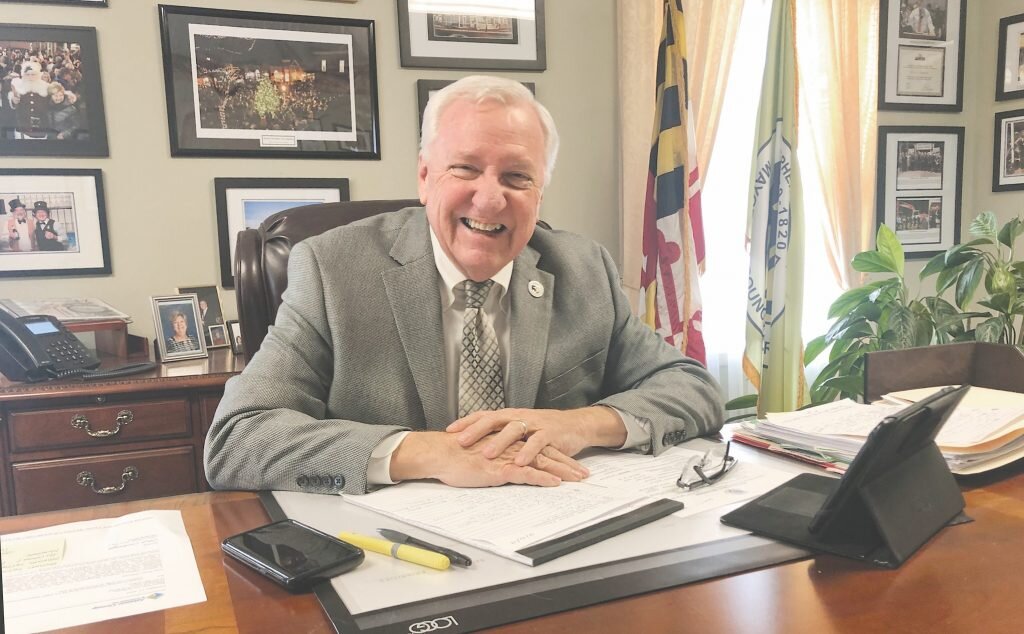Restoring wastewater fund, building community center also make list for 2020

RACHEL RAVINA/BAYSIDE GAZETTE
Berlin Mayor Gee Williams says this will be the year that the idea of an excursion train will either pull into the station or go away.
By Rachel Ravina, Staff Writer
(Jan. 2, 2020) Finances, infrastructure and policy goals are top priorities that Berlin’s elected officials hope to tackle this year.
“First and foremost to get the finances in order. That’s absolutely priority one,” said Councilman Troy Purnell.
Despite a tumultuous budget process, the Town Council approved a $15.2 million budget for fiscal year 2020 in June 2019.
Berlin Mayor Gee Williams said there will be discussions over the next several months regarding the fiscal year 2021 budget.
“I think that the new year will be very quickly immersed into the budget process for fiscal ’21, and that will need to establish a reserve policy and we’ll need to look if there needs to be [an] upward adjustment in stormwater fees,” Williams said.
Last year’s budget process resulted in a property tax increase to $.80 per $100 of assessed value. During a previous budget discussion, Mayor Gee Williams said that fiscal year 2021’s rate is “to be determined.”
It’s something with which Councilman Zack Tyndall disagrees. He said he offered several suggestions to avoid a tax increase last year, and emphasized the need to keep taxes low.
“I saw [a] path forward that didn’t include a tax increase, and now that the tax increase has gone into effect, I definitely see no need for future tax increase[s] for the people of Berlin,” Tyndall said.
Additionally, there were increases to two enterprise funds: the sewer and water utilities.
“The wastewater is my number one priority because that seems to be the number one problem,” Purnell said.
Berlin’s sewer utility has lost money for years because of the low rates and funds borrowed from the general fund reserves. Purnell added that they’re brainstorming about how to restore the fund, and he said he hopes to receive some answers by February.
“We’ve already been working on it,” Purnell said.
The stormwater utility fund is also important to elected officials such as Tyndall, who said constituents in his district have experienced flooding near Henrys Mill and Henrys Green. He added that he’d like to tackle some preventative stormwater management initiatives.
“So, looking into the 2020 calendar year, I’m really looking for ways that we can leverage the money coming in through the stormwater fund and making sure every dollar that comes in is used to its fullest extent,” Tyndall said.
Purnell and Councilman Elroy Brittingham also stressed the importance of addressing infrastructure concerns.
Purnell said that repairing Harrison Avenue is on his list. He added that it could cost anywhere from $300,000 to $500,000 to complete the work.
“It’s going to take the taxpayers to come in and say, ‘Hey, we want to pave that road. We want you to spend our money to pave that road,’” Purnell said.
Brittingham also said that Showell Street also needs repair.
“Most of the streets are down to the point where you can’t just repave them, you almost got to demolish the street and start over again,” Brittingham said.
As for new development, Brittingham and Williams said they’d like to make progress on the proposed community center on Flower Street.
“That center is way past its time because they only allow for so many years for it to be used and it’s probably — I don’t know — probably 10 years past it’s time,” Brittingham said.
It requires transferring the deed of the existing multipurpose building from the Berlin Community Improvement Association. Brittingham added that once that’s completed, officials can begin the process of applying for grants.
Brittingham also said he’d like to see the new space have meeting spaces and an indoor basketball court.
Brittingham and Williams said that it’s something they’d like to see happen this year. Once the paperwork is filed, Williams said constructing the new building could take approximately three years.
In addition to the community center, also goals for Williams are establishing short-term rental regulations and economic generators.
Williams said he’d like to have legislation passed to regulate short-term rentals including Airbnb’s in town.
“To be responsible, we need to have regulations that are right for Berlin, and I do think this is the year to do it,” Williams said.
The long-discussed excursion train could be a revenue and tourism generator in Berlin. Williams said it involves the Maryland-Delaware Railroad Company and a potential train operator coming to an understanding.
“I think once they reach an agreement … the engine will start, and then how fast it goes and how it goes, but I think that this is the year that it either will happen or it will go away,” he said.
Williams also said he’d like to have a conversation with county officials about the possibility of a tax differential in Berlin.
“We’re all in this to provide services to the public and we all have our different responsibilities, but really, it can work so much better if we’re coordinating with them,” Williams said. “So I think that has to be part of the discussion.”
